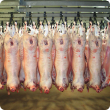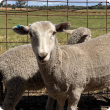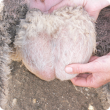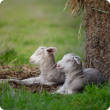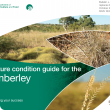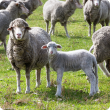Sheep
The key products of the Western Australian sheep industry are wool, sheepmeat (lamb and mutton) and live sheep. At around 12.4 million sheep, the WA flock turns off between 4.5 and 6 million sheep and lambs for meat and live export as well as 65 million kilograms of greasy wool (primarily for export markets) annually.
The Merino is the most common breed of sheep in WA, making up 80% of the state's flock. The remainder are ‘British breeds’ or so-called maternal breeds, meat specific breeds such as Dorpers and some breeds for specialty meat and fibre markets.
The Department of Primary Industries and Regional Development's current focus is on increasing lamb supply, improving the productivity, welfare and sustainability of sheep production and developing and extending targeted information products and services to generate practice change. In an effort to increase the marking rate of lambs, the department, in collaboration with industry, has developed the More Sheep initiative.
Filter by search
Filter by topic
- Livestock management (118) Apply Livestock management filter
- Pests, weeds & diseases (46) Apply Pests, weeds & diseases filter
- Management & reproduction (44) Apply Management & reproduction filter
- Diseases (44) Apply Diseases filter
- Livestock health & diseases (44) Apply Livestock health & diseases filter
- Biosecurity & quarantine (43) Apply Biosecurity & quarantine filter
- Biosecurity (41) Apply Biosecurity filter
- Livestock biosecurity (35) Apply Livestock biosecurity filter
- Livestock disease surveillance (33) Apply Livestock disease surveillance filter
- Feeding & nutrition (26) Apply Feeding & nutrition filter
- Beef cattle (25) Apply Beef cattle filter
- Livestock parasites (19) Apply Livestock parasites filter
- Livestock research & development (17) Apply Livestock research & development filter
- Goats (15) Apply Goats filter
- Dairy cattle (15) Apply Dairy cattle filter
- Crops (13) Apply Crops filter
- Pastures (11) Apply Pastures filter
- Pigs (8) Apply Pigs filter
- Livestock movement & identification (8) Apply Livestock movement & identification filter
- Genetics & selection (8) Apply Genetics & selection filter
- Horses (8) Apply Horses filter
- Pasture management (7) Apply Pasture management filter
- Food, export & investment (7) Apply Food, export & investment filter
- Climate, land & water (6) Apply Climate, land & water filter
- Camelids (5) Apply Camelids filter
- Animal welfare (5) Apply Animal welfare filter
- Climate & weather (4) Apply Climate & weather filter
- Invasive species (3) Apply Invasive species filter
- State Barrier Fence (3) Apply State Barrier Fence filter
- Emergency animal disease preparedness (3) Apply Emergency animal disease preparedness filter
- Control methods (3) Apply Control methods filter
- Bees (3) Apply Bees filter
- Mechanical, physical and cultural (2) Apply Mechanical, physical and cultural filter
- Stockfeed (2) Apply Stockfeed filter
- Poultry & birds (2) Apply Poultry & birds filter
- Investment attraction (2) Apply Investment attraction filter
- Agricultural exports (2) Apply Agricultural exports filter
- Climate change (2) Apply Climate change filter
- Dry seasons and drought (2) Apply Dry seasons and drought filter
- Food & beverages (1) Apply Food & beverages filter
- Land use (1) Apply Land use filter
- Export services (1) Apply Export services filter
- Grains (1) Apply Grains filter
- Buy West Eat Best (1) Apply Buy West Eat Best filter
- Agribusiness Food & Trade (1) Apply Agribusiness Food & Trade filter
- Breeding & varieties (1) Apply Breeding & varieties filter
- Chemicals (1) Apply Chemicals filter



